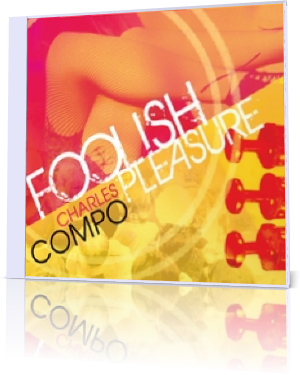Something a little different, that’s Charles Compo’s
Foolish Pleasure (Chaos Music, 2012). Though composed of all-new
material, the music is a throwback to the days when horn players –
saxophonists and trumpeters, mainly – stepped out from the jazz orchestra
and fronted smaller ensembles, playing music their own way. Among them:
Jackie MacLean, Miles Davis, Freddie Hubbard, Cannonball Adderley. There’s
a little bit of pop, a little bit of fusion and a lot of Compo’s
showmanship.
Compo plays flute and tenor saxophone mostly, but he
also contributes with guitar and 12-string guitar. Tony Stewart and Jeff
Miller share the keyboard duties. Jerry Brooks and Dave Jones split the
load on bass. The rest of the ensemble consists of Ted Daniel on trumpet,
Camille Gainer on drums and Mustafa Ahmed on percussion.
“Keeping It Real” is an easygoing piece that features
Compo on both his horns, layered. Jones sets the tone with a bass groove,
and Stewart handles the Rhodes. The music can apply to many situations – a
night stroll on the beach, a drive in the country or something sensual.
“Arctic Spring” is an upbeat tune that could pass for the theme of a 1960s
police drama. It has a bit of an Isaac Hayes feel (think, The Men). Compo
shows his versatility, leading on flute at one point and then tenor later.
His rhythm guitar isn’t to be overlooked. Gainer and Ahmed are active in
the background.
Weather Report meets Tom Scott & The L.A. Express on “Six Was Eight.”
Brooks’ bass line reminds one of Jaco Pastorius. Compo brings out more
electric guitar, and again balances lead between tenor and flute. Miller
stretches out a bit on keys.
Compo has collaborated or performed with a diverse list of artists,
including Twyla Tharp, Christina Aguilera and Martha Reeves. As a
composer, arranger and performer, he has credits in film and on
television, and he has been featured at the Hennessey Jazz Festival, the
Bell Atlantic Jazz Festival and the Vision Festival.
Each of Foolish Pleasure’s 12 tracks works as a stand-alone tune,
but they all could work well as part of a motion picture score as they
serve the dual purpose of listening enjoyment and inspiring an action
scene. The running times range from the relatively short “Mom’s Midnight
Dilemma” (3:03) to the not-exactly long “Rockaway” (5:48) – not a lot of
variance, but enough to avoid the pitfall of sounding forced or
cookie-cutter. And while this is a showcase for Compo’s talent as a
songwriter and versatility as a musician, the input of the session players
maintains a group dynamic throughout.

www.charlescompo.com


